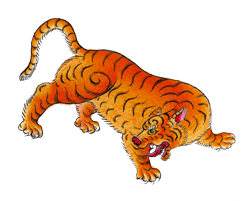Difference between revisions of "Tiger"
| Line 1: | Line 1: | ||
| + | {{SeealsoDPL/button}} | ||
[[Image:Tiger_cal.jpg|thumb|325px|]] | [[Image:Tiger_cal.jpg|thumb|325px|]] | ||
| + | |||
| + | |||
| + | |||
| + | |||
| + | |||
'''[[Tiger]]''' (Tib. ''[[tak]]''; [[Wyl.]] ''[[stag]]'') — one of the [[four dignities]], which represent qualities of the [[windhorse]]. | '''[[Tiger]]''' (Tib. ''[[tak]]''; [[Wyl.]] ''[[stag]]'') — one of the [[four dignities]], which represent qualities of the [[windhorse]]. | ||
Latest revision as of 15:10, 2 December 2015
Click here to see other articles relating to word Tiger
Tiger (Tib. tak; Wyl. stag) — one of the four dignities, which represent qualities of the windhorse.
The tiger symbolizes the wind element. It abides in the south. It is said to represent unconditional confidence, disciplined awareness, kindness and modesty.
Source
The tiger is a symbol of strength, military prowess. Tigers were indigenous to eastern Tibet, where the Wutun Monastery is located. A more subtle meaning has to do with Tantric Buddhism. Tiger skins were a favored meditational mat for Tantric sages. In Tantric Buddhism, the tiger skin represents the transmutation of anger into wisdom and insight, also offering protection to the meditator from outside harm or spiritual interference. Tiger icons in Tibetan Buddhism are most prevalent in eastern Tibet, appearing on more furniture and rugs here than anywhere else in Tibet.
